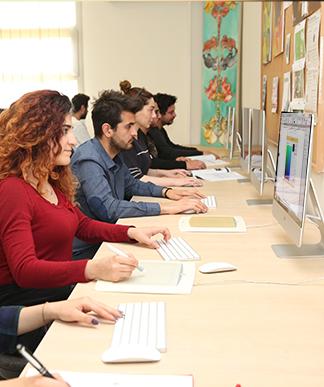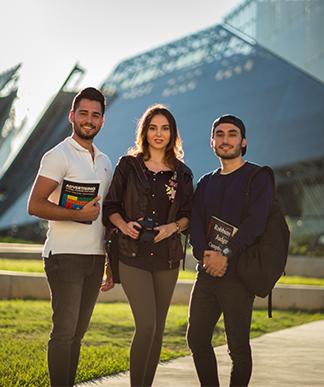


About the Department
Department of Public Relations and Advertising at CIU aims to prepare our students for diverse and highly competitive careers in the fields of public relations and advertising. Our goal is to provide our graduates with the credentials that meet or go beyond the expectations of the sector and to prepare them to be productive and creative communication experts with social responsibility and ethics. The medium of instruction is English and it is designed to teach students both theory and practice oriented courses. Our two 20-days-long summer training, first in the field of public relations and second in the field of advertising, enable students to gain experience in these fields and see the application of theories in real-life practices.
Accreditations
Public Relations and Advertising Program has been accredited as of March 1st, 2019, by the Communication Education Evaluation Accreditation Board (ILEDAK), which is an institution authorized in performing external evaluations and issues accreditation certificates in the field of communication.
Educational Opportunities
With a teaching staff consisting of both academics and media industry specialists, our department prepares its students with the knowledge and skills meeting the requirements of the public relations and advertising fields. Public relations and advertising professionals also meet our students through panels, seminars, conferences and workshops. The department’s Public Relations and Advertising Club is open to all faculty students and serves as a platform for students to organize activities and create advertising and public relations campaigns. Public Relations and Advertising students also have the opportunity to work in the CIU News Agency and CIU Radio and Television studios, to help them develop writing, reporting and audio-visual skills necessary in the public relations and advertising professions.

Career Areas
Graduating students will able to find employment at a variety of public and private institutions. Those who wish to pursue their career in the field of advertising can be employed in advertising agencies, graphic design studios and marketing departments. Graduates who look for jobs in the field of public relations can have a career in government offices, municipalities, trade organizations, banks, hospitals, hotels and many other organizations as public relations professionals, corporate communication directors, public relations specialists, or communication experts. Graduates who are interested in further education can continue at post-graduate programs of universities and can pursue academic careers.
Contact
Faculty of Communication
Çevik Uraz Center, CU124
Tel: +90 392 671 1111 Extension: 2301
Faculty E-mail: secretary-foc@ciu.edu.tr
Head of Department: Asst. Prof. Dr. Bahar Taşeli
Head of Department E-mail: btaseli@ciu.edu.tr
Compulsory Courses
First Semester
INTRODUCTION TO MASS COMMUNICATION
Course code
COMM101Credit
3Theoretical
3Practical
0Ects
6MEDIA LITERACY
Course code
COMM133Credit
3Theoretical
3Practical
0Ects
6READING AND WRITING SKILLS-I
Course code
ENGL141Credit
3Theoretical
2Practical
2Ects
4INTRODUCTION TO PUBLIC RELATIONS
Course code
PRAD111Credit
3Theoretical
3Practical
0Ects
6SOCIOLOGY
Course code
SOCY101Credit
3Theoretical
2Practical
0Ects
5TURKISH LANGUAGE
Course code
TREG100Credit
0Theoretical
2Practical
0Ects
2TURKISH
Course code
TURK100Credit
0Theoretical
2Practical
0Ects
2Second Semester
INTRODUCTION TO NEW MEDIA
Course code
COMM104Credit
3Theoretical
3Practical
0Ects
6READING AND WRITING SKILLS-II
Course code
ENGL142Credit
3Theoretical
2Practical
2Ects
4HISTORY OF CIVILIZATION
Course code
HIST100Credit
0Theoretical
2Practical
0Ects
2INTRODUCTION TO COMPUTERS
Course code
ITEC110Credit
3Theoretical
3Practical
0Ects
4INTRODUCTION TO JOURNALISM
Course code
JOUR102Credit
3Theoretical
3Practical
0Ects
4INTRODUCTION TO ADVERTISING
Course code
PRAD112Credit
3Theoretical
3Practical
0Ects
5PSYCHOLOGY
Course code
PSYC110Credit
3Theoretical
3Practical
0Ects
6MODERN TURKISH HISTORY
Course code
TARH100Credit
0Theoretical
2Practical
0Ects
2Third Semester
MARKETING AND CONSUMER BEHAVIOR
Course code
BUSN365Credit
3Theoretical
3Practical
0Ects
6BASIC PHOTOGRAPHY
Course code
COMM231Credit
4Theoretical
3Practical
2Ects
6HISTORY OF COMMUNICATION
Course code
COMM261Credit
3Theoretical
3Practical
0Ects
6ESSENTIALS OF ECONOMICS
Course code
ECON211Credit
3Theoretical
3Practical
3Ects
6FUNDAMENTALS OF ADVERTISING DESIGN
Course code
PRAD203Credit
3Theoretical
2Practical
2Ects
6Fourth Semester
THEORIES OF MASS COMMUNICATION
Course code
COMM212Credit
3Theoretical
3Practical
0Ects
5SOCIAL MEDIA IN COMMUNICATION
Course code
COMM254Credit
3Theoretical
3Practical
0Ects
5Research Methods for Communication
Course code
COMM366Credit
3Theoretical
3Practical
3Ects
5MEDIA LAW AND ETHICS
Course code
ILAW242Credit
3Theoretical
3Practical
0Ects
5ENGLISH FOR PUBLIC RELATIONS AND ADVERTISING
Course code
PRAD204Credit
3Theoretical
3Practical
0Ects
5UNIVERSITY ELECTIVE
Course code
UNIEXX1Credit
3Theoretical
3Practical
0Ects
5Fifth Semester
FREE ELECTIVE
Course code
FREEXX1Credit
3Theoretical
3Practical
0Ects
5SUMMER TRAINING-I
Course code
PRAD200Credit
0Theoretical
0Practical
0Ects
6PRODUCTION TECHNIQUES IN ADVERTISING
Course code
PRAD311Credit
3Theoretical
2Practical
2Ects
4CAMPAIGN DESIGN IN PUBLIC RELATIONS
Course code
PRAD313Credit
3Theoretical
2Practical
2Ects
6AREA ELECTIVE
Course code
PRADXX1Credit
3Theoretical
3Practical
0Ects
5AREA ELECTIVE
Course code
PRADXX2Credit
3Theoretical
3Practical
0Ects
5Sixth Semester
FREE ELECTIVE
Course code
FREEXX2Credit
3Theoretical
3Practical
0Ects
5MEDIA PLANNING
Course code
PRAD322Credit
3Theoretical
3Practical
0Ects
6CREATIVITY IN ADVERTISING
Course code
PRAD324Credit
3Theoretical
2Practical
2Ects
6CAMPAIGN DESIGN IN ADVERTISING
Course code
PRAD332Credit
3Theoretical
2Practical
2Ects
7Area Elective
Course code
PRADXX3Credit
3Theoretical
3Practical
0Ects
5Seventh Semester
FREE ELECTIVE
Course code
FREEXX3Credit
3Theoretical
3Practical
0Ects
5SUMMER TRAINING-II
Course code
PRAD300Credit
0Theoretical
0Practical
0Ects
6POLITICAL COMMUNICATION
Course code
PRAD453Credit
3Theoretical
3Practical
0Ects
3Area Elective
Course code
PRADXX4Credit
3Theoretical
3Practical
0Ects
5UNIVERSITY ELECTIVE
Course code
UNIEXX2Credit
3Theoretical
3Practical
0Ects
5ARTIFICIAL INTELLIGENCE APPLICATIONS
Course code
VICD421Credit
3Theoretical
2Practical
2Ects
7Eighth Semester
FREE ELECTIVE
Course code
FREEXX4Credit
3Theoretical
3Practical
0Ects
5GRADUATION PROJECT
Course code
PRAD414Credit
3Theoretical
2Practical
2Ects
9INTEGRATED MARKETING COMMUNICATION
Course code
PRAD428Credit
3Theoretical
3Practical
0Ects
6Area Elective
Course code
PRADXX5Credit
3Theoretical
3Practical
0Ects
5UNIVERSITY ELECTIVE
Course code
UNIEXX3Credit
3Theoretical
3Practical
0Ects
5Elective Courses
PUBLIC ADDRESS
Course code
COMM322Credit
3Theoretical
3Practical
3Ects
5CASE STUDIES IN MARKETING COMMUNICATION
Course code
ADPR442Credit
3Theoretical
3Practical
0Ects
SOCIAL RESPONSIBILITY PROJECTS MANAGEMENT
Course code
PRAD461Credit
3Theoretical
3Practical
0Ects
5WRITING FOR MASS COMMUNICATION
Course code
COMM222Credit
3Theoretical
3Practical
0Ects
5PHOTOJOURNALISM
Course code
JOUR342Credit
3Theoretical
3Practical
0Ects
5PUBLIC RELATIONS CASE STUDIES
Course code
ADPR350Credit
3Theoretical
3Practical
0Ects
5GLOBAL JOURNALISM
Course code
JOUR433Credit
3Theoretical
3Practical
0Ects
5MARKETING RESEARCH IN ADVERTISING
Course code
PRAD429Credit
3Theoretical
3Practical
0Ects
5JOURNALISM CASE STUDIES
Course code
JOUR450Credit
3Theoretical
3Practical
0Ects
5INTRODUCTION TO CULTURAL STUDIES
Course code
COMM144Credit
3Theoretical
3Practical
0Ects
4CONTEMPORARY WORLD CINEMA
Course code
RTVC431Credit
3Theoretical
3Practical
0Ects
5PORTFOLIO DESIGN
Course code
VICD404Credit
3Theoretical
3Practical
0Ects
HISTORY OF CINEMA
Course code
RTVC361Credit
3Theoretical
3Practical
0Ects
5FILM GENRES
Course code
RTVC466Credit
3Theoretical
3Practical
0Ects
5RADIO AND TV MANAGEMENT
Course code
RTVC452Credit
3Theoretical
3Practical
0Ects
5POLITICAL ECONOMY AND MEDIA
Course code
COMM457Credit
3Theoretical
3Practical
0Ects
5CINEMATOGRAPHY
Course code
RTVC253Credit
3Theoretical
3Practical
0Ects
5CYBER CULTURE
Course code
VICD405Credit
3Theoretical
3Practical
0Ects
3FUNDAMENTALS OF TELEVISION PRODUCTION
Course code
RDTV312Credit
4Theoretical
3Practical
2Ects
6NEWS WRITING-I
Course code
JOUR321Credit
3Theoretical
3Practical
0Ects
5INTRODUCTION TO DIRECTING
Course code
RDTV401Credit
4Theoretical
3Practical
2Ects
6FILM PRODUCTION TECHNIQUES
Course code
RTVC353Credit
3Theoretical
2Practical
2Ects
5WRITING FOR TELEVISION
Course code
RTVC261Credit
3Theoretical
3Practical
0Ects
3PAGE DESIGN-II
Course code
JOUR432Credit
3Theoretical
3Practical
0Ects
6DOCUMENTARY PRODUCTION
Course code
RTVC302Credit
3Theoretical
2Practical
2Ects
5PACKAGE DESIGN
Course code
VICD308Credit
3Theoretical
2Practical
2Ects
5INTERACTIVE ART AND DESIGN
Course code
VICD407Credit
3Theoretical
3Practical
0Ects
3VISUAL LITERACY
Course code
RTVC467Credit
3Theoretical
3Practical
0Ects
5ONLINE JOURNALISM
Course code
JOUR456Credit
3Theoretical
3Practical
0Ects
4SOCIAL MEDIA APPLICATIONS
Course code
PRAD459Credit
3Theoretical
3Practical
0Ects
5DIGITAL MEDIA INTERFACE DESIGN
Course code
VICD110Credit
3Theoretical
2Practical
2Ects
6TV GENRES
Course code
RTVC411Credit
3Theoretical
3Practical
0Ects
5FILM ANALYSIS
Course code
RTVC342Credit
3Theoretical
3Practical
0Ects
3POLITICAL JOURNALISM
Course code
JOUR381Credit
3Theoretical
3Practical
0Ects
5EDITING
Course code
RTVC365Credit
3Theoretical
2Practical
2Ects
5INTERVIEW TECHNIQUES
Course code
JOUR455Credit
3Theoretical
3Practical
0Ects
5CAMERA AND LIGHTING TECHNIQUES FOR CINEMA AND TELEVISION
Course code
RTVC214Credit
3Theoretical
2Practical
2Ects
6AESTHETICS
Course code
VICD302Credit
3Theoretical
3Practical
0Ects
4INTRODUCTION TO GAME ENGINES
Course code
GADS102Credit
4Theoretical
3Practical
2Ects
8TR Applicants
TR Students who are successful in the exams conducted by the Higher Education Council Student Selection and Placement Center (ÖSYM) and are entitled to enroll in our university in line with their preferences can complete the registration process with the necessary documents for registration from our Registration and Liaison Offices throughout Turkey or from the Marketing Directorate on campus.
Click for detailed admission requirements information.
TRNC Applicants
TRNC citizens and TR citizen candidate students who have completed their entire high school education in TRNC. They are placed in undergraduate programs in line with their success in the CIU Student Placement and Scholarship Ranking Exam and the programs they prefer.
Students who are successful in the exam can register from the TRNC Marketing Office.
Applicants can directly apply online to our undergraduate programs using the application portal. Please fill in your details correctly and upload all the required documents listed on the last page of the application form.
Required documents;
- Completed application form,
- Higher/Secondary Certificate or equivalents (e.g. O/A’Level, WAEC/NECO),
- Evidence of English Language competence: TOEFL (65 IBT) or IELTS (5.5). Students without these documents will take the CIU English proficiency exam on campus following arrival,
- Scanned copy of international passport/birth certificate,
- Fully completed and signed CIU Rules and Regulations document (which can be downloaded during the online application).
Cyprus International University provides academic scholarships for its students as an incentive for success, with most students benefiting from 50%, 75% or 100% scholarships or discounted tuition fees. Click for more information.
Tuition Fees are determined at the beginning of each academic year. Candidate students who are entitled to enroll in CIU can learn their fees in line with the Tuition Fee Calculation system.
Program Objectives of Public Relations and Advertising are as follows:
PO1: To ensure that students possess the theoretical knowledge required to succeed in academic studies and professional practices in public relations and advertising.
PO2: To equip students with the ability to select and use contemporary tools and technologies necessary for professional applications in public relations and advertising.
PO3: To develop students' critical thinking, problem-solving, and analytical skills for effective public relations and advertising practices.
PO4: To train students to become skilled public relations and advertising specialists with effective communication and strong presentation skills, teamwork abilities, creativity, self-confidence, and a commitment to ethics and professional standards.
PO5: To train students to become professionals who embrace ethical codes, professional standards, and democratic values in the fields of public relations and advertising, while respecting human rights and having a strong sense of social responsibility.
Program outcomes of Public Relations and Advertising are as follows:
PO1: Knows the basic concepts, theories, methods, and models in the fields of public relations, advertising, marketing, and integrated marketing communication.
PO2: Knows how to create public relations and advertising messages suitable for the target audience, plan media, and develop strategies.
PO3: Understands that public relations is a management function and knows organizational communication models.
PO4: Knows crisis management, corporate promotion, and media and digital media communication techniques.
PO5: Knows research and planning methods and techniques in public relations and advertising, and has data literacy.
PO6: Is familiar with legal regulations and professional ethical values related to public relations and advertising.
PO7: Plans and implements communication efforts and events for all stakeholders in organizations.
PO8: Conducts marketing research, analyzes consumer behavior, and plans based on these data.
PO9: Designs public relations, advertising, and media campaigns, and effectively uses digital platforms and social media.
PO10: Creates advertising messages considering the different characteristics of communication environments and applies presentation techniques.
PO11: Behaves in accordance with the standards and ethical codes of national and international professional organizations.
PO12: Follows social developments, analyzes changes in target audience behavior, and uses this information in campaigns.
PO13: Has the ability to solve problems individually or as a team member and takes responsibility for related tasks.
PO14: Recognizes potential issues in crisis management processes and contributes to producing solutions and taking preventive measures.
PO15: Develops and implements brand and communication strategies.
PO16: Adopts the principle of lifelong learning, regularly follows professional innovations, and applies them effectively in their work.